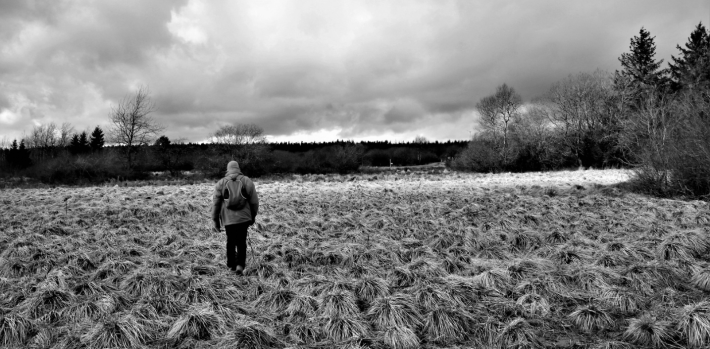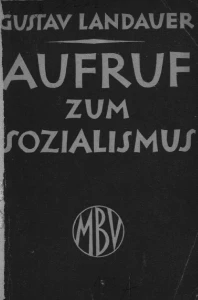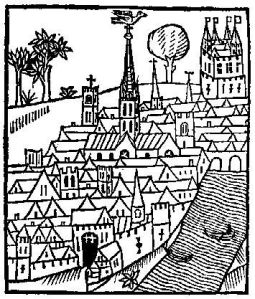by Paul Cudenec
If there is one thinker who has most shaped my own political evolution over the years, then it is the German-Jewish anarchist Gustav Landauer.
I first came across his ideas three decades ago, at a crucial period when I was building up my understanding of the anarchist tradition and sketching out, in my mind, the shape of my own personal anarchist vision.
I would say that Landauer has influenced me in three important ways.
Firstly, he showed me that spirituality is not, as some claim, incompatible with anarchism but, on the contrary, essential to its authenticity.
Secondly, he pointed me to the importance of combining an overall sense of belonging to the human species with an appreciation of particular, rooted, cultures and communities.
He confirmed for me that this conception of an organic society cannot honestly be dismissed, as it sadly and absurdly sometimes is, as some kind of “crypto-fascism”.
Landauer’s worldview (like mine) in fact represents the exact opposite of the cult of dehumanising authoritarian industrial-militarism which was to grab control of his home country 14 years after his untimely death.
Thirdly, the story of his political life, in which he was largely spurned by members of his own movement who were trapped inside the conformist groupthink of the era, told me of the overriding need always to follow one’s own inner ideological compass rather than to cravenly seek safety in the shared opinions of any particular political herd.
That lesson has served me well over the last few years and I know that it will continue, in all circumstances, to guide my approach in the future.
So thank you Gustav!
The following is a new article on Landauer that I have written for the Organic Radicals site, a much-expanded and considerably-improved version of the profile I posted in 2019.
By the way, I will be talking about the organic radical philosophy at a free event in Edinburgh, Scotland, on the evening of Thursday May 30, 2024.

Gustav Landauer (1870-1919) was an important anarchist theorist and key precursor of organic radicalism, murdered by proto-Nazi soldiers in Stadelheim Prison, Munich, after the collapse of the Bavarian Revolution.
Strongly influenced by Novalis, Friedrich Hölderlin and Johann Wolfgang von Goethe, Landauer was very much part of the Romantic anti-capitalist tradition identified by Michael Löwy and has been described as representing “a left-wing form of the völkisch current in thought”. [1]
Like his friend Martin Buber, he saw a close link between human interrelationships and the rebirth of community which was needed to put society right.
Landauer also echoed the likes of William Morris and John Ruskin, and prefigured Guy Debord, in condemning what he called this “odious society of masquerade”, [2] the industrial capitalist “unculture” from which free people needed to separate themselves.
He wrote in 1911: “Progress, what you call progress, this incessant hustle-bustle, this rapid tiring and neurasthenic, short-breathed chase after novelty, after anything new as long as it is new, this progress and the crazy ideas of the practitioners of development associated with it… this progress, this unsteady, restless haste; this inability to remain still and this perpetual desire to be on the move, this so-called progress is a symptom of our abnormal condition, our unculture”. [3]

Helmut Rüdiger comments: “Landauer does not share the progressivist optimism so evident in the conceptions of Marx as in other revolutionary theories; he demands awareness of the human, rather than blind confidence in the development of Technik and science”. [4]
Landauer translated several texts by Peter Kropotkin, [5] whom he met during a brief spell in England, and was very much influenced by the idea of the authentic human community, the Gemeinschaft, described by Ferdinand Tönnies. [6]
He also translated into German writing by Bengali poet and fellow organic radical inspiration Rabindranath Tagore. [7]
Like Constantin von Monakow, he extended his concept of the organic to a cosmic level, regarding the universe as a living creature with a collective soul and writing that “the psyche [das Seelenhafte] in the human being is a function or manifestation of the infinite universe”. [8]

Landauer’s libertarian “socialism” was in truth, as Peter Marshall writes, “a form of mystical anarchism which stood in the German idealist tradition stretching back as far as Meister Eckhart.
“His originality lies in the way he developed the romantic concern with the Volk in a libertarian rather than an authoritarian direction.
“The word Volk had come to mean something like the ‘common people’, but it was also used to describe the German language, culture and customs as distinct from the State. Landauer wanted to realize the potential unity of the Volk… Landauer was thus an eloquent prophet of real community”. [9]
His view of human communities, and indeed the human species itself, as being living organisms meant that he did not see any essential conflict between collective and individual interests.
He declared. “Anarchy is the expression of the liberation of man from the idols of the state, the church and capital; socialism is the expression of the true and genuine community among men, genuine because it grows out of the individual spirit”. [10]
He argued that fellow anarchist Max Stirner’s notion of an absolute and independent individual was a phantom, as each individual belonged to their community, and to humankind, both physically and spiritually.

“As the individual organism is only a part of a great, real physical community, so the individual soul is part of a great, real spiritual community… a vital part of a larger organic whole”. [11]
Individuals should rid themselves of their ego, in a “mystical death”, so as to become fully part of the living human community, believed Landauer.
He wrote: “Restore the natural order; understand the wise words of Socrates: know thyself! Know thyself, as thou are really”.
One should also know the other as the kindred human soul that he really was, “behind the mask that, just like you, he wears”. [12]
In a 1918 letter to his daughter, Gudula Landauer, he told her that one found meaning in life by setting oneself a personal task.
“This task, however, has nothing to with apparent ambitions or success. How could it be that every child of humanity could be destined to be exceptional? Our task is to be good…” [13]
His belief in authentic individuality, rather than the individualism of fragmented modern society, was reflected in the way he conducted his own life.
Despite – or perhaps because of – the depth and quality of his work, he was often treated as a pariah, rejected by “comrades” who would have preferred him to think less and simply parrot the slogans of the day.
He wrote to Max Nettlau in 1910 that he found himself in a movement of “epigones”, of second-rate imitators and followers.
He added: “You know that I am a heretic. But you perhaps don’t know to what extent I am”. [14]
Rudolf Rocker wrote that “Landauer tried to forge new concepts, leaving behind, if necessary, the previous marked-out furrows” and this made him the sworn enemy of the “philistines”, who stuck to existing norms and only took “well-trod mental paths”.
This meant that he often found himself working alone, “without paying too much attention to the judgement of the crowds”. [15]

Comments Freddy Gomez: “At the end of the day, this proponent of necessary separation needed to have broken from the existing community of anarchists in order to give the best of himself to anarchism”. [16]
Landauer was inspired by organic medieval society, which he contrasted with contemporary top-down artificiality.
He wrote: “The state, with its police and all its laws and its contrivances for property rights, exists for the people as a miserable replacement for Geist and for organizations with specific purposes; and now the people are supposed to exist for the sake of the state, which pretends to be some sort of ideal structure and a purpose in itself, to be Geist…
“Earlier there were corporate groups, clans, gilds, fraternities, communities, and they all interrelated to form society. Today there is coercion, the letter of the law, the state”. [17]
“Wherever centralism and bureaucracy reign; there is no community, no synergy, no liberation of joyful forces”. [18]
Landauer explained that the state combined with industrialism to destroy all authentic collective spirit.

Writes Charles Maurer: “The most obvious sign of the absence of Geist was for Landauer the plight of the industrial workers.
“Separated from the earth and its products and spiritually isolated from each other despite the closeness of their living conditions, they become victims of alcohol, disease, and poverty.
“The relationship between worker and employer becomes completely dehumanized through capitalism, technology, and the state”. [19]
Landauer bitterly opposed Marxists for remaining trapped in this mechanistic mindset and for failing to lead a deep and effective resistance to industrial capitalism.
He complained about their attachment to the notion of “the worker”, adding: “It’s not the dictatorship of the proletariat that should be the slogan, but the abolition of the proletariat”. [20]
Russell Berman and Tim Luke explain that, for Landauer, Marxism was itself “part of the problem posed by industrialization”. [21]
They add: “Marxism, despite its revolutionary appearance, functions in fact as an impediment to socialism. In the light of Landauer’s critique, nineteenth century scientific socialism ceases to appear as a radical critique of the status quo. Rather, behind its revolutionary pretenses, it buttresses the development of capitalist structures”. [22]

In his booklet For Socialism, Landauer was vehemently outspoken against the Marxists who had taken control of the socialist movement of which he considered himself a part.
He described their dogma as “the plague of our times and the curse of the socialist movement” [23] and bemoaned “the grotesque wrongness of their materialist conception of history” [24] in which they reduced everything to “what they call economic and social reality”. [25]
In December 1918 he warned, in a letter, against the Bolshevik variant of Marxism: “A particularly worrying case is that of the Bolsheviks (the Spartacists): pure centralists as were Robespierre et al, who aspire to nothing, to nothing except power; they are preparing the way to a military regime which would be even more monstruous than anything the world has seen until now”. [26]
Landauer also hinted at his disquiet over the growing influence of Marxism, and its modes of thinking, on the anarchist movement.
He refered disparagingly to “the syndicalists and the anarcho-socialists, recently so-called by a pitiful misuse of two noble names” as the Marxists’ “brothers” [27] and specifically extended his condemnation to all Marxists “whether they call themselves Social Democrats or anarchists”. [28]
From his genuinely radical perspective, the problem with Marxist-influenced thinking was that it showed no way out of the overall system, diverting all radical energy into futile political battles.

Speaking on behalf of real anarchists, he wrote: “We don’t have political aspirations, but rather anti-political aspirations”. [29]
He explained: “We start to make socialism real by ceasing to be slaves of capital. We start to make socialism real when we no longer produce for the market of products as paid workers”. [30]
Producers and consumers were the same people, although in industrial society this reality was hidden behind the structures of employment and wages.
The separation of the two processes and roles, through the involvement of “parasitical” [31] middle-men bosses, had created an absurd situation in which people had to earn wages to buy what they had themselves produced.
It was time to “break the distorting mirror of the intermediary usury” and recreate the direct connection between production and consumption.
“Would the result not be that there would no longer be any merchandise, since there would be no intermediary, no commercial profit, no wages, no ‘money’, no employee, no employer?”. [32]

“Today, of course, capital is usury’s interest and money, for we have made the sign representing the expected product, in other words the means of exchange, into a king and an extortionist; but the people could immediately overcome this monstrosity by communalising their consumption, organising free reciprocated credit, and they could work for their own needs and exit from ‘capitalism’. They could, if they had the land! Society can only be capitalist because the masses are without land”. [33]
“People and land! Land and freedom! It is only when local people’s institutions (Volksgemeinden) own the soil, as they did of old in every country, that the essence of the people (Volkstum) and freedom will become real”. [34]
For Landauer, it was the destruction of organic communal cohesion that enabled economic and social subjugation.
“There are links between people that allow them to work and to exchange – or there is the absence of links, which gives birth to parasitism, exploitation and monopoly”. [35]

Landauer was very much opposed to the usual left-wing tendency to merely dream of a future revolution and insisted that the work had to start now, within the existing society.
“We must not say: today we are not free but tomorrow, by who knows what wave of a magic wand, we will be free; we have to say: we all, without exception, have freedom inside us and we only have to bring it out into exterior reality”. [36]
“We have to start looking around us and search for a space for free initiative, for autonomous creation!” [37]
One of his practical suggestions was for the setting-up of co-operative or communal bread ovens.
At the same time as fighting back against the invasion of the lifeless chemical bread of the food industry, people would thus be restoring traditional crafts and cultures gobbled up by capitalism and encouraging individual diversity – individuality – within the unity. [38]

Landauer’s vision of the action that needed to be taken looked simultaneously forward and backward in time and thus beyond the modern linear concept of history: “Our movement comes from centuries past and reaches towards centuries in the future. [39]
“Our colony can not be built merely on ideas and theory without being attached to an authentic tradition; and it will be all the more beautiful if it is born from the union of the colony-builders with an existing village which agrees to welcome them, which calls upon them, which supports them, which wants, with them, to revive former communal institutions, whose memory has almost been lost”. [40]
Landauer’s use of “mystical” terms like Geist (spirit) and Seelenhafte (psyche) forms an inherent part of his anarchism, flowing naturally from the rest of his philosophy.
His vision was based on living human communities, social organisms with their own guiding collective spirit arising from below and from within.
The idea of Geist also fed into Landauer’s ideas regarding revolution, along with his related concept of Wahn, a kind of inebriating resonance which could bring about sudden radical change.
He explained: “Wahn is not only every goal, every ideal, every belief in a sense of purpose of life and the world: Wahn is every banner followed by mankind; every drumbeat leading mankind into danger; every alliance that unites mankind and creates from a sum of individuals a new structure, an organism”. [41]
Landauer said the spark for revolution was always the stupidity, brutality or weakness of rulers, but that “the people, the thinkers, the poets are a powder keg, loaded with spirit and the power of creative destruction”. [42]

The energy of Wahn would ensure that this powder keg ignited: “There is no need to fear a lack of revolutionaries: they actually arise by a sort of spontaneous generation – namely when the revolution comes.
“The voice of the spirit is the trumpet that will sound again and again and again, as long as men are together. Injustice will always seek to perpetuate itself; and always as long as men are truly alive, revolt against it will break out”. [43]
Anarchism, said Landauer, was “a collective name for transformative ambitions” [44] and its role was to encourage Wahn and help create the resonance of revolution.
In this way it could rid the human social organism of the stifling restrictions imposed by the centralised industrial system and allow it to breathe and flourish in a free and natural way.
As Landauer famously declared: “Anarchy is life; the life that awaits us after we have freed ourselves from the yoke”. [45]

[1] Russell Berman & Tim Luke, ‘Introduction’, Gustav Landauer, For Socialism, trans. by David J Parent, (St Louis: Telos Press, 1978), p. 8.
[2] Gustav Landauer, ‘Polizisten und Mörder’, 1910, cit. Gaël Cheptou, ‘Pour moi, les morts vivent’, A Contretemps (Paris: Numéro 48 – Mai 2014), p. 10.
[3] Landauer, For Socialism, pp. 35-36.
[4] Helmut Rüdiger, ‘Ein deutscher freiheitlicher Sozialist: Gustav Landauer’ in Gustav Landauer. Worte der Würdigung (Darmstadt: Verlag Die freie Gesellschaft, 1951), pp. 12-26, A Contretemps, p. 19.
[5] Cheptou, p. 8.
[6] Peter Marshall, Demanding the Impossible: A History of Anarchism (London: Fontana Press, 1993), p. 411.
[7] Cheptou, p. 8.
[8] Gustav Landauer, Skepsis und Mystik: Versuche im Anschluss an Mauthners Sprachkritik (Cologne: 2d ed, 1923) p. 7, cit. Charles B. Maurer, Call to Revolution: The Mystical Anarchism of Gustav Landauer (Detroit: Wayne State University Press, 1971), p. 69.
[9] Marshall, p. 411.
[10] Gustav Landauer, Der Sozialist, 15 July 1911, cit. Marshall, p. 410.
[11] Gustav Landauer, quoted in Eugene Lunn, The Prophet of Community: The Romantic Socialism of Gustav Landauer (Berkeley: University of California Press, 1973), pp. 107, 110, cit. Marshall, p. 412.
[12] Landauer, ‘Polizisten und Mörder’, cit. Cheptou, p. 10.
[13] Gustav Landauer, letter to Gudula Landauer, 30 September, 1918, cit. Christoph Knüppel, ‘Sur le sol ferme de la glèbe s’élèvera un jour l’heure de la liberté’, A Contretemps, p. 30.
[14] Gustav Landauer, letter to Max Nettlau, August 10, 1910, cit. Cheptou, p. 9.
[15] Rudolf Rocker, Revolucion y regresion (1918-1951), cit. Freddy Gomez, ‘Gustav Landauer, un anarchiste de l’envers’, A Contretemps, p. 4.
[16] Gomez, p. 4.
[17] Gustav Landauer, Aufruf zum Sozialismus (Berlin: 2nd ed, 1919), pp. 19-20, cit. Charles B. Maurer, Call to Revolution: The Mystical Anarchism of Gustav Landauer (Detroit: Wayne State University Press, 1971), p. 93.
[18] Gustav Landauer, ‘Das zweite Flugblatt: Was ist zunächst zu tun?’, 1909, A contretemps, p. 63.
[19] Maurer, pp. 108-109.
[20] Gustav Landauer, Letter to Margarete Susman, 23 November 1918, cit. Rüdiger, p. 18.
[21] Berman & Luke, ‘Introduction’, For Socialism, p. 10.
[22] Berman & Luke, Introduction, For Socialism, p. 11.
[23] Landauer, For Socialism, p. 32.
[24] Landauer, For Socialism, p. 123.
[25] Landauer, For Socialism, p. 56.
[26] Gustav Landauer, letter to Margarete Susman, 13 December 1918, cit. Rüdiger, p. 17.
[27] Landauer, For Socialism, p. 57.
[28] Landauer, For Socialism, p. 82.
[29] Gustav Landauer, ‘Quelques mots à propos de l’anarchisme’, 1897, A contretemps, p. 57.
[30] Landauer, ‘Das zweite Flugblatt: Was ist zunächst zu tun?’, p. 62.
[31] Landauer, ‘Das zweite Flugblatt: Was ist zunächst zu tun?’, p. 63.
[32] Landauer, ‘Das zweite Flugblatt: Was ist zunächst zu tun?’, p. 62.
[33] Gustav Landauer, ‘Das dritte Flugbatt: Die Siedlung’, 1910, A contretemps, p. 68.
[34] Landauer, ‘Das zweite Flugblatt: Was ist zunächst zu tun?’, p. 63.
[35] Gustav Landauer, ‘Individualismus’, 1911, cit. Cheptou, p. 11.
[36] Landauer, ‘Individualismus’, cit. Cheptou, p. 11.
[37] Gustav Landauer, ‘Les syndicalistes révolutionnaires français’, 1909, p. 65.
[38] Cheptou, p. 11.
[39] Gustav Landauer, ‘La Colonie’, 1909, A contretemps, p. 66.
[40] Landauer, ‘La Colonie’, p. 67.
[41] Gustav Landauer, Beginnen: Aufsätze über Sozialismus, ed. Martin Buber, Cologne, 1924, p. 16, cit. Maurer, p. 92.
[42] Gustav Landauer, ‘Die Revolution’, 1907, Revolution and Other Writings: A Political Reader, ed. and trans. by Gabriel Kuhn, (Oakland: PM Press, 2010) p. 170.
[43] Landauer, For Socialism, pp. 82 & 130.
[44] Landauer, Letter to Julius Babb, 15 September, 1904, Revolution and Other Writings, p. 304.
[45] Landauer, ‘Anarchismus-Sozialismus’, 1895, Revolution and Other Writings, p. 74.
